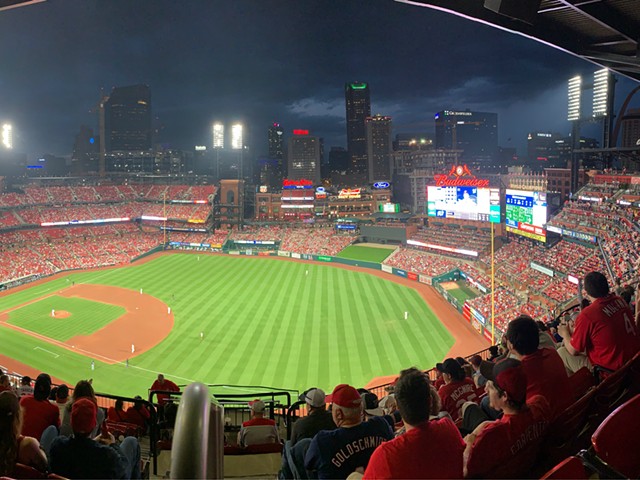With all the recent hubbub over St. Louis maybe, possibly, no-we-really-mean-it-this-time landing a franchise in the wonderland of Major League Soccer (MLS), there's one feature that has to make the league fun for everyone to watch, even for non-fans:
The goal posts are always moving.
In the most recent breathtaking news, the league's Supreme Council of Charlatans (a.k.a. Board of Governors) announced on April 19 that MLS would be expanding to 30 teams most people have never heard of, as opposed to the current 27 that we can't begin to name. The big significance is that the expansion almost guarantees that St. Louis will be placed on MLS' invisible map, unless it isn't.
"St. Louis likely to get MLS team after league votes to expand to 30 teams," reported the Post-Dispatch. And the league is so excited about adding three teams instead of just the one originally planned, instead of charging $150 million for each team's franchise fee, it will now charge $200 million. Bravo.
But while cynics might argue that adding $50 million to the price of poker meets the classic definition of moving back the goal posts, it should be noted that the billionaire ownership group aiming to put a team in St. Louis (that's the Taylor family, which owns Enterprise Holdings, and World Wide Technology CEO Jim Kavanaugh) seems at least publicly unfazed by a little $50 million bump.
Good for them. It's fine that the Taylors, Kavanaugh and others are winning local applause for getting a sports franchise that might help heal the collective psyche of a town wounded by the departure of the Rams, and before that, the Big Red and the Hawks. To the extent MLS appeals to a young audience, that's another plus.
Good for the city, too. Developing the area around Union Station is a fine thing, and so is providing a first-rate soccer facility for fans (and presumably local teams) in a city that arguably has the best soccer heritage of any in the nation. We should all prefer getting an MLS team to not getting an MLS team.
That said, this is not what it appears to be. An MLS team is not some huge economic engine, it is not transformational and whether we get chosen by this obnoxious group of greedy monopolists — including one Enos Stanley Kroenke — is absolutely not a statement about the worth or future of St. Louis. I say that with all due respect to the many people who think getting a franchise is essential even though they cannot name a single MLS player.
Understand we're talking about a team that will play just seventeen home games stretched over a seven-month season, in a stadium seating just 22,500, with ticket prices far less expensive, especially on a season-long basis, than other pro sports in the U.S. This is not a game changer.
Certainly, the proposed MLS franchise would generate nice value as a construction project, creating good jobs that pay into the earnings tax and other public revenues, at least those not given away by our local politicians. But from a regional perspective it represents mostly recirculated revenues.
A soccer team doesn't add to our collective wealth. It's not a major tourist draw. For the same reason that the Rams' departure didn't take a giant bite out of the local economy — the dollars spent by local fans having now been freed up for some other entertainment purpose — sports franchises coming and going are eternally overrated in terms of their economic impact.
There's one other thing you should know about MLS teams: They strangely don't generate the numbers that would justify $200 million franchise buy-ins.
For perspective, let's look to Forbes, the undisputed authority on the wealth of sports franchises. Last November, Forbes.com listed the values, revenues and operating income of the existing 23 MLS teams. They ranked in valuation from brand-new juggernaut Atlanta United's $330 million down to Kroenke's Colorado Rapids, worth $155 million, at the bottom. But get this: No fewer than 15 of the 23 teams had net operating losses, according to Forbes, for a combined total of negative $63 million. The league's total revenues were little more than $800 million, a tiny number relative to the robust franchise valuations estimated by Forbes.
Contrast that with the National Hockey League, fourth in stature to Major League Baseball, the NFL and NBA. According to Forbes, 25 of the 31 NHL teams turned operating profits — an impressive $766 million in the black as opposed to MLS' $63 million in the red — on revenues of more than $4.8 billion (or six times the size of MLS). Our own once-shaky St. Louis Blues, with a reported $148 million in gross revenues, do more than four times the business of an average MLS team.
So why would people pay big dollars for a marginal MLS team? Because they're really paying for something totally unrelated and unhelpful to their respective local sports scenes. They're buying a piece of MLS' worldwide action.
The real value of an MLS franchise is not the soccer pitch. It's the marketing pitch.
There is an exploding value to the international merchandising and marketing and TV revenues of soccer around the globe, and that's why MLS franchises are a far hotter commodity than the league itself, or teams in places like St. Louis.
The Taylors and their partners aren't simply making a generous civic gift by getting an MLS team for St. Louis. They're probably making a pretty fair investment as well.
Here's how the benefit of ownership is described on the MLS website:
"MLS has a unique ownership and operating structure, based on a 'single entity' concept. Unlike other professional sports leagues, which are a confederation of independent franchise owners, MLS' 'single entity' structure allows investors to own an interest in the league, as well as individual teams. MLS believes that the structure will better position the league for long term success."
Owning an interest in the league also means owning an interest in something called Soccer United Marketing, the for-profit marketing arm of the MLS. Among the things you get by joining the MLS club is a piece of the wildly lucrative riches of soccer marketing and merchandising throughout much of the Western hemisphere.
Soccer United Marketing is the "exclusive marketing partner" of the United States Soccer Federation and its counterparts from Mexico to the Caribbean to South America. MLS commissioner Don Garber recently described the 2026 FIFA World Cup — jointly hosted by the U.S., Mexico and Canada — as "rocket fuel." Get the point?
And so a St. Louis MLS team has less to do with St. Louis than with the power of soccer as a booming international juggernaut. The billionaires who are lining up to invest staggering amounts to join the league — here and elsewhere — aren't doing it for altruism, nor are they stupid. The bottom line is the bottom line. And it's not especially local.
That certainly argues against the need for public subsidies to support this effort, although good luck selling that to the local media and political class. As is its custom, the city of St. Louis has already agreed to a corporate-welfare package relieving the wealthy team owners of sales and property taxes that most other companies have to pay. And with MLS backers having said "there's more work to do," the goodies may grow.
If your goal is to understand what's really going on here, take your best shot.
But good luck with that. Those goal posts are moving.
Ray Hartmann founded the Riverfront Times in 1977. Contact him at [email protected] or catch him on St. Louis In the Know With Ray Hartmann and Jay Kanzler from 9 to 11 p.m. Monday thru Friday on KTRS (550 AM).






